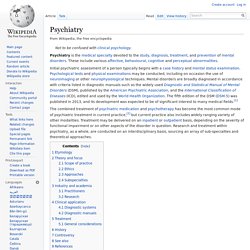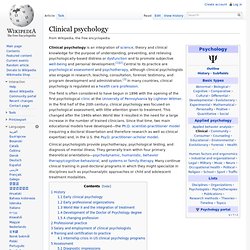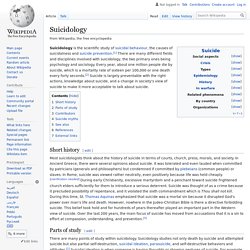

Mental disorder. Distressing thought or behavior pattern A mental disorder, also called a mental illness[2] or psychiatric disorder, is a behavioral or mental pattern that causes significant distress or impairment of personal functioning.[3] Such features may be persistent, relapsing and remitting, or occur as a single episode.

Many disorders have been described, with signs and symptoms that vary widely between specific disorders.[4][5] Such disorders may be diagnosed by a mental health professional. Services are based in psychiatric hospitals or in the community, and assessments are carried out by mental health professionals such as psychiatrists, psychologists, and clinical social workers, using various methods such as psychometric tests but often relying on observation and questioning. Treatments are provided by various mental health professionals. Psychotherapy and psychiatric medication are two major treatment options. Definition Nervous illness About half of them are depressed. Classifications Other. Psychiatry. Initial psychiatric assessment of a person typically begins with a case history and mental status examination.

Psychological tests and physical examinations may be conducted, including on occasion the use of neuroimaging or other neurophysiological techniques. Mental disorders are broadly diagnosed in accordance with criteria listed in diagnostic manuals such as the widely used Diagnostic and Statistical Manual of Mental Disorders (DSM), published by the American Psychiatric Association, and the International Classification of Diseases (ICD), edited and used by the World Health Organization. The fifth edition of the DSM (DSM-5) was published in 2013, and its development was expected to be of significant interest to many medical fields.[1] The combined treatment of psychiatric medication and psychotherapy has become the most common mode of psychiatric treatment in current practice,[2] but current practice also includes widely ranging variety of other modalities. Etymology[edit] no data.
Psychological testing. Psychological testing refers to the administration of psychological tests.

A psychological test is "an objective and standardized measure of a sample of behavior" (p. 4).[1] The term sample of behavior refers to an individual's performance on tasks that have usually been prescribed beforehand. The samples of behavior that make up a paper-and-pencil test, the most common type of test, are a series of items. Performance on these items produce a test score. A score on a well-constructed test is believed to reflect a psychological construct such as achievement in a school subject, cognitive ability, aptitude, emotional functioning, personality, etc. Differences in test scores are thought to reflect individual differences in the construct the test is supposed to measure. Psychological tests[edit] Psychological assessment is similar to psychological testing but usually involves a more comprehensive assessment of the individual. Clinical psychology. Clinical psychology is an integration of science, theory and clinical knowledge for the purpose of understanding, preventing, and relieving psychologically-based distress or dysfunction and to promote subjective well-being and personal development.[1][2] Central to its practice are psychological assessment and psychotherapy, although clinical psychologists also engage in research, teaching, consultation, forensic testimony, and program development and administration.[3] In many countries, clinical psychology is regulated as a health care profession.

The field is often considered to have begun in 1896 with the opening of the first psychological clinic at the University of Pennsylvania by Lightner Witmer. In the first half of the 20th century, clinical psychology was focused on psychological assessment, with little attention given to treatment. This changed after the 1940s when World War II resulted in the need for a large increase in the number of trained clinicians. Suicidology. Suicidology is the scientific study of suicidal behaviour and suicide prevention. [1] There are many different fields and disciplines involved with suicidology, the two primary ones being psychology and sociology.

Every year, about one million people die by suicide, which is a mortality rate of sixteen per 100,000 or one death every forty seconds.[2] Suicide is largely preventable with the right actions, knowledge about suicide, and a change in society's view of suicide to make it more acceptable to talk about suicide. Short history[edit] Most suicidologists think about the history of suicide in terms of courts, church, press, morals, and society.
In Ancient Greece, there were several opinions about suicide. It was tolerated and even lauded when committed by patricians (generals and philosophers) but condemned if committed by plebeians (common people) or slaves. Parts of study[edit] There are many points of study within suicidology.